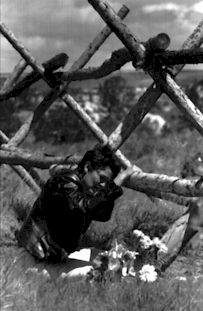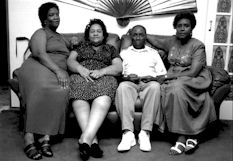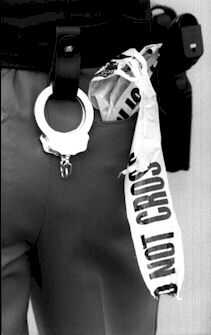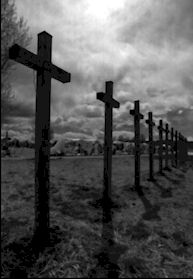 |


|
|
|
|
By Michael Claussen
 Facing west at the corner of 20th and Stout streets in downtown Denver resides a most curious mural.
Painted in stark black and white on the right half of the brick canvas are the familiar faces of humanity's
turbulent history; faces that include the company of Martin Luther King, Jr., Cesar Chavez, Rigoberta
Menchu Tum, and Archbishop Tutu. On the left half, painted in vibrant rainbow colors are the words: "In
memory of Matthew Shepard." The message of this Peace Jam painting is simple: "Make a friend out of an
enemy."
Facing west at the corner of 20th and Stout streets in downtown Denver resides a most curious mural.
Painted in stark black and white on the right half of the brick canvas are the familiar faces of humanity's
turbulent history; faces that include the company of Martin Luther King, Jr., Cesar Chavez, Rigoberta
Menchu Tum, and Archbishop Tutu. On the left half, painted in vibrant rainbow colors are the words: "In
memory of Matthew Shepard." The message of this Peace Jam painting is simple: "Make a friend out of an
enemy."
Nearly forty two years ago, Dr. Martin Luther King, Jr., addressed his congregation in Montgomery, Alabama, with the following words: "I want to turn your attention to this subject: 'Loving Your Enemies.' It's so basic to me because it is part of my basic philosophical and theological orientation—the whole idea of love, the whole philosophy of love....Far from being the pious injunction of a utopian dreamer, the command [to love] is an absolute necessity for the survival of our civilization. Yes, it is love that will save our world and our civilization, love even for enemies." On October 6, 1998, a terrible violence was perpetrated against a member of the human community. Found by a man on a bicycle who at first thought that he was just a scarecrow, Matthew Shepard, a gay University of Wyoming student, had been beaten, burned, robbed, tied to a wooden ranch fence, and left in subfreezing temperatures without shoes for nearly eighteen hours. Matthew's parents, Dennis and Judy Shepard, having returned from Saudi Arabia where Dennis Shepard works as an oil rig safety inspector, joined Matthew at Poudre Valley Hospital in Fort Collins, Colorado. While waiting with the uncertainty of Matthew's prognosis, Dennis and Judy Shepard released the following statement on October 10, 1998:
On October 12, 1998, the world awoke to the sad cry that Matthew Shepard had passed away. The accused perpetrators of this crime, Russell Arthur Henderson and Aaron McKinney, both residents of Laramie, Wyoming, and roofers by trade, were arrested and charged with attempted murder, kidnapping, and robbery. Chastity Vera Pasley and Kristen LeAnn Price, girlfriends of the accused, were also arrested on charges of being accessories to the crime. In April, 1999, Russell Henderson submitted a guilty plea to his charges, admitting his part in the murder of Matthew Shepard. According to Henderson, the two perpetrators drank "a few pitchers of beer" at one bar and then proceeded to another, the Fireside, where both Henderson and McKinney noticed Shepard. In Henderson's account, it was Aaron McKinney who originated the plan to lure Shepard from the bar by posing as homosexuals. "Aaron mentioned to me that he wanted to take him out and rob him," Henderson said. Despite Henderson's claim to have disagreed with McKinney's plan, he went along with it, taking Shepard for a ride in a truck belonging to McKinney's father.
Instead of placing a call for medical help, Henderson stated that he and his girlfriend, Chastity Vera Pasley, and McKinney's girlfriend, Kristen LeAnn Price, drove fifty miles east to Cheyenne, Wyoming, to dump his bloody clothes in order "to cover up that I was out there when Matthew was beaten." Prosecutors are seeking the death penalty against Aaron McKinney, who is scheduled to go on trial in October, 1999. It is anticipated that both Russell Henderson and Chastity Vera Pasley will testify against McKinney at his trial. Chastity Vera Pasley and Kristen LeAnn Price have both pleaded guilty to being an accessory after the fact to first degree murder. Pasley was sentenced to fifteen to twenty four months in jail for her role in the attempted cover-up.
As we approach the anniversary of Matthew Shepard's death, we are reminded once again that we live in a human society riddled with the aberrations of hate. The story of Matthew Shepard touches deeply into the sentiments of the world gay and straight communities alike, resounding in Judy Shepard's words that Matthew "could have been anybody's son....[He] looked so innocent...he was everybody's kid." Look in the mirror. Matthew could have been you. Matthew could have been me. In looking over the past year and half, we see a frightening trend continuing across the country. Crimes based solely upon the principle of hate seem to crop up like bonfires burning a fragile landscape. In June of 1998, James Byrd, Jr., age 49, was savagely dragged behind the back of a pick-up truck for three miles along Huff Creek Road in Jasper, Texas. His crime was the color of his skin. While walking along Martin Luther King Boulevard on the fateful Sunday of his death, Byrd was picked up by three white ex-convicts in a pick-up truck, beaten, and chained to the truck by his ankles with a towing chain. Strung out for the three mile length along Huff Creek Road are the haunting reminders of the horror Byrd experienced: seventy four pink circles spray-painted onto the pavement mark the places where investigators retrieved the remains of James Byrd or his personal effects.
As we look into the personal life of James Byrd, Jr., and note that he left behind a wife, two daughters, a son, and a granddaughter, we are once again reminded of the humanity behind the loss. He could have been you. He could have been me. And who could forget the tragedy that hit home to so many of us on April 20, 1999, at Columbine High School, in Littleton, Colorado? I know that on that day, I watched the news in shock, observing helicopter footage circle the houses of my hometown neighborhood and fearing whether friends and family within the building were alive. Two teenagers, Eric Harris and Dylan Klebold, self-proclaimed members of a subculture known as the "Trenchcoat Mafia," opened fire with an arsenal of weaponry upon students and teachers, killing and wounding several people before ending their own lives. The targeted victims were African Americans, jocks, and the so called "popular" students. After mounting evidence of petty vandalism perpetrated by the killers, published plans for the murders found on a web-site, a detailed journal of their emerging plans for murder, recorded videos and essays submitted as school projects that contained strongly violent themes, and continued threats to classmates, the United States was forced to question how two boys growing up in suburban Denver could have progressed so far along their plans for murder without detection or intervention. Suddenly, the tables were turned as word reached home that a family friend was killed in the massacre. The statement that it could have been me that was a victim of hate was no longer an illusive concept; it was a reality.
But how does a country beaten and torn by the subcurrents of hate suture its wounds and move toward peaceful co-habitation? Many experts agree that what is required is a combination of more stringent hate-crime laws and community awareness and education programs designed to encourage diversity-awareness. Within the pre-amble to the Hate Crimes Prevention Act of 1998, spearheaded by Senator Kennedy, D-Massachusetts, and submitted on November 13, 1997, "the incidence of violence motivated by the actual or perceived race, color, national origin, religion, sexual orientation, gender, or disability of the victim poses a serious national problem; such violence disrupts the tranquility and safety of communities and is deeply divisive; existing Federal law is inadequate to address this problem; ...although many local jurisdictions have attempted to respond to the challenges posed by such violence, the problem is sufficiently serious, widespread, and interstate in scope to warrant Federal intervention to assist such jurisdictions; and many States have no laws addressing violence based on the actual or perceived race, color, national origin, religion, sexual orientation, gender, or disability, of the victim, while other States have laws that provide only limited protection." While the Hate Crimes Prevention Act of 1998 provides for strict penalties for perpetrators of hate crimes, the Act has yet to pass through the legislative system successfully.
In a recent press conference at the National Lesbian and Gay Journalists Association annual conference in Atlanta, Georgia, Judy Shepard responded to questions about her choice to serve as a public figure and activist against hate. She stated: "I don't want this to ever happen again...I'm determined to make whatever difference I can, for Matt." She then paraphrased a quote from Henry David Thoreau: "When a friend dies, you take on the responsibility of their life and their goals." As part of the anti-hate movement, the Human Rights Campaign Foundation in cooperation with Judy Shepard unveiled two new public television spots aimed at curbing anti-gay violence and promoting a greater understanding of gay issues. Based upon the theme Choose to Understand, the two thirty-second spots are designed to inspire genuine reflection about what motivates animus toward gay people and suggest that it is time to dismantle these motivations. Within the public service announcement regarding friendship, Judy Shepard states: "I am the mother of Matthew Shepard. He was my son, my friend, my confidant. My constant reminder of how good life can be. He was murdered in October of 1998 because he was gay. There was just something about him that just made people want to talk to him, want to share, want to be his friend. You measure a person's success by the friends they leave behind. And I think Matt was a great success." In the announcement regarding parenthood, Judy Shepard says that "Being a parent is a job. You have days of absolute bliss that you thought you could never experience. And there are days that are so low, you wonder why you ever became a parent. You know in a perfect world because your child is gay, you don't worry about their safety. You just worry about them being happy. I loved Matthew just the way he was." In addition to her work with the Human Rights Campaign, Judy Shepard has been a very active participant in the formation of an educational documentary designed to challenge viewers to explore the issue of hate, examine their own belief systems, and ask themselves what choices they will make as we enter the new millennium. Brent Scarpo, founder of New Light Media and co-producer of the documentary Journey to a Hate Free Millennium: Stories of Hope and Compassion, approached Dennis and Judy Shepard at the Human Rights Campaign dinner in Denver this past February with an idea to produce the film. After participating in a memorial vigil for Matthew Shepard in October, 1998, Scarpo and his co-producer Martin Bedogne, were struck by the show of community support as Santa Monica Boulevard in Los Angeles, California, filled with people carrying candles and marching in silence. "First, it was the dragging death of James Byrd, Jr., in Texas, and then it was Matthew," stated Scarpo. "When was enough going to be enough? Martin and I were so saddened that we had to do something." "This film, its message, the concept, and the entire reason behind it was to find answers and to seek solutions to this madness," added Bedogne. Having established New Light Media as an organization that seeks to stimulate, educate, and impact the world through multimedia works that celebrate and honor the human spirit, Scarpo came to an agreement with Judy Shepard that the film they were to collaborate on would be intended for educational use with the focus of enacting positive change.
The film, scheduled to debut on October 12, 1999, in Fort Collins, Colorado—the anniversary date and location of Matthew Shepard's death—investigates the questions: what is hate? what happens when we choose to hate? what happens when we choose not to hate? As a viewer gains an understanding of hate, the film introduces the real life stories of individuals whose lives have been dramatically altered by hate and who have made the difficult choice not to hate in return. Through interviews with well-known public figures, ordinary people, youth, and children, the film explores how society can come together to combat hate in all of its forms. Interviews in the film include Judy Shepard; Darrell and Craig Scott, father and brother to Rachel Scott who was slain at the Columbine High School shooting; Holocaust survivors; Thomas James Leyden, a former skinhead and fifteen-year member of the neo-Nazi White Supremacy Movement who now, in conjunction with the Simon Wiesenthal Center in Los Angeles, speaks out against hate; Elton John, who agreed to allow footage from his concert in Wyoming for Matthew Shepard and the Columbine High School victims to be included in the film; Olivia Newton John; and actor John Dye, from the television series Touched by an Angel. In response to the debut of the film, Bedogne stated that "This will be a week that we hope America will begin its own journey to a hate free millennium. Through the remembrance of victims of these awful hate crimes that are now so prevalent, and through this film can people begin to dialogue and stop the hate. We know this project will be part of the solution." "The message on this night will be to put an end to hate and create a more loving and accepting society for all people," added Scarpo. "This film is only the first step of many that we have planned as an action against hate and to move an entire nation toward developing a society in the new century that will be hate free. We are hopeful that we will be able to achieve this." In a sermon given to Trinity College in Hartford, Connecticut, by the Reverend Steven Charleston following the death of Matthew Shepard, the following words were spoken: "Crimes of hate may live in shouts of rage, but they are born in silence...Before we jump to decry Matthew's senseless death or before we seek to rationalize it with loud disclaimers, I hope we will just hear the silence. A young man's heart has ceased to beat. Hear the silence of that awful truth. It is the silence of death. It is the silence that descends on us like a shroud. At Trinity, as in Wyoming, we are men and women surrounded by the silence of our own fear. Our fear of those who are different. Our fear of being identified with the scapegoat. Our fear of taking an unpopular position for the sake of those who can not stand alone. Our fear of social and religious change....As a person of faith, I will listen....and I will remember. And I will renew my resolve never to allow this silence to have the last word. Not for Matthew. Not for gay men or lesbian women. Not for any person in our society of any color or condition who has been singled out for persecution. Not in my church. Not in my nation. Not in Wyoming. And not at Trinity College."
Courtesy of Quest Magazine Subscriptions: $2 per issue: Quest Publishing 1115 Broadway, Suite 105 Denver, Colorado 80203 |

© 1997-99 BEI
 Romaine Patterson mourns where her best friend Mattthew
Shepard was tied and beaten
Romaine Patterson mourns where her best friend Mattthew
Shepard was tied and beaten  Mural of Matthew Shepard by Denver graffiti artist Marz
Mural of Matthew Shepard by Denver graffiti artist Marz  The family of James Byrd, Jr., at home in Jasper,
Texas
The family of James Byrd, Jr., at home in Jasper,
Texas  Police officer at Columbine High School Memorial
Police officer at Columbine High School Memorial  Elton John stands with Dennis and Judy Shepard at
the Matthew Shepard and Columbine High School Memorial Concert in
Wyoming
Elton John stands with Dennis and Judy Shepard at
the Matthew Shepard and Columbine High School Memorial Concert in
Wyoming  Producers/directors Martin Bedogne and Brent
Scarpo
Producers/directors Martin Bedogne and Brent
Scarpo 